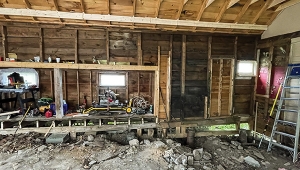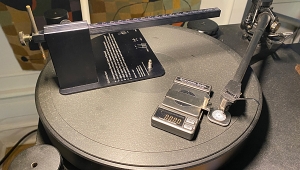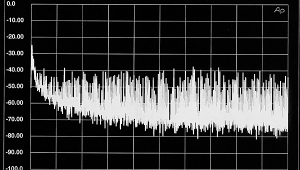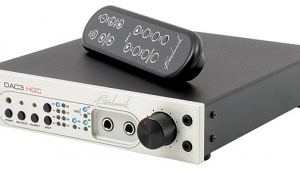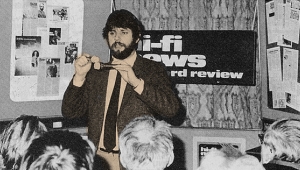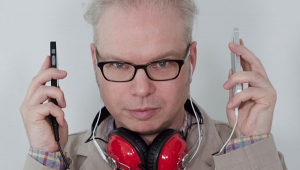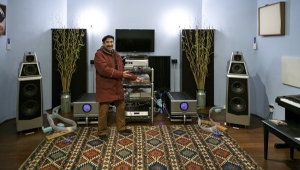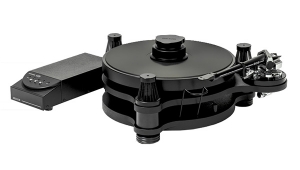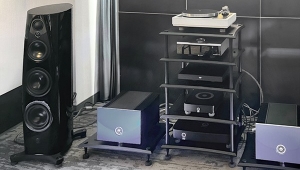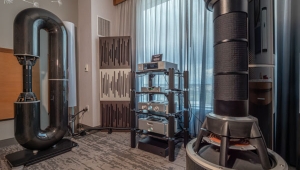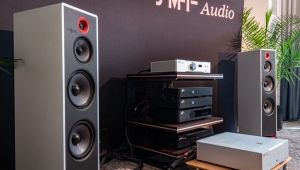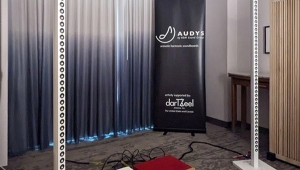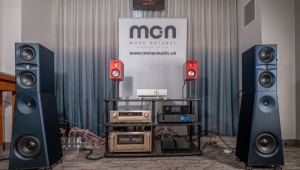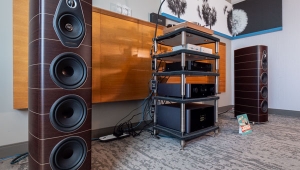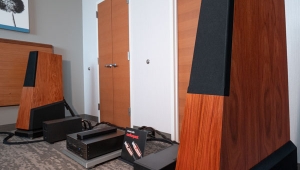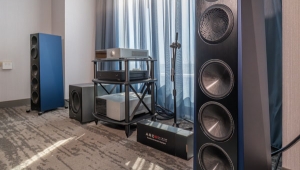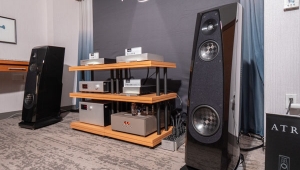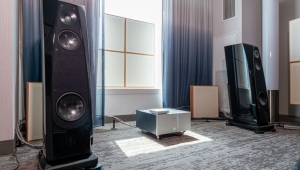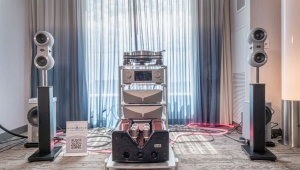| Columns Retired Columns & Blogs |
A Mosaic of Music: Stereophile's Clarinet Quintet CD Page 5
Atkinson: There were many moments of pure magic in that Kansas church. For me, the highlight was the slow movement of the Brahms, with its shifting rhythmic structure over which the clarinet, played without the safety net of vibrato, paints a hauntingly beautiful line. And of course, you were turning in a cracking performance of the first movement of the Brahms when it was ruined by a police helicopter that not only flew over the studio, but returned to hover over it!
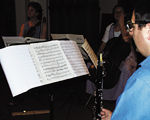 Michaelson: We'll forget about that! [laughs] But let me tell you a story about the Brahms Quintet. When I first heard it, when I was 16 or 17, I just didn't understand it at all. But as I played it as background music for about a week, gradually the idiom and the language began to sink in. So if people find it a bit dark and a bit strange, if they just put it on as background music for a couple of weeks, the brain will sort out what it's about.
Michaelson: We'll forget about that! [laughs] But let me tell you a story about the Brahms Quintet. When I first heard it, when I was 16 or 17, I just didn't understand it at all. But as I played it as background music for about a week, gradually the idiom and the language began to sink in. So if people find it a bit dark and a bit strange, if they just put it on as background music for a couple of weeks, the brain will sort out what it's about.
Atkinson: The Mozart is certainly more approachable, which is why we decided to start the CD with it.
Michaelson: Do you know the joke in the Mozart? The tune in the last movement—pom pom pom pom, da-dee la-dee pom pom? The clarinet never gets it—not until the very end. The clarinet gets every damn thing else, all those elaborate variations, but it doesn't get the damn tune. [laughs] You know the variation with the big leaps and all that crap—if you listen to the strings, they've got the tune. Over and over again, throughout the whole movement, the clarinet has not got the tune.
Atkinson: But surely it's worth it when you finally get the tune in the coda.
Michaelson: Oh yes, it's always worth it when you get a Mozart tune. [laughs]
Atkinson: How do you feel about recording these pinnacles of the clarinet repertoire?
Michaelson: They're such overpowering masterworks, I marvel at the controlled power of the harmony and the narrative progression of the harmony and the music. The idea that I'm allowed to play them—and the idea that most people don't know these amazing works—is just astonishing. I mean, I have nothing to say that hasn't been said before. This is the trouble with recorded music: When you've heard the greats, like Alfred Prinz or Gervase de Peyer, do the Brahms Clarinet Quintet, you don't need to hear Antony Michaelson. I mean, let's get real here. [laughs]
Atkinson: That's a frightening prospect—every musician having to compete on record with everybody in the past.
Michaelson: I had a wonderful chat with Ingrid Jacoby about this when we were recording the Brahms sonatas together. Ingrid, who's a really great pianist, said, "You know, I don't think music is a competitive sport." I think that's true. I think that every artist has to do as best they can when they're playing, and sincerely present the music as best they can. And the music will work. The player may not be a genius, but the music was written by a genius.
Of course, it depends on whether you take a Romantic or Classical view, whether you think the musician is a tortured artist baring his soul before everybody, or whether you think it's somebody making an honest representation of what was written down and intended by the composer.
Atkinson: But then, of course, the raw notes on the page can be so lacking in information, the composer relying on the performing tradition to fill in the blanks.
Michaelson: Brahms isn't so bad. If you play exactly what Brahms wrote, obviously there's an awful lot of room for dynamic changes, for pitch changes, for ensemble, for balance, and so on and so forth, but you'll still get quite near it. With Mozart, however, if you play just what is written on the music you'll get nothing.
Atkinson: Of course, with the Mozart quintet you're having to make changes anyway, because it was originally written for a basset clarinet with extra low notes.
Michaelson: Yes, that's much more evident in the concerto, but in the Larghetto of the Quintet, there are three or four places where it was obviously written for the basset clarinet.
Atkinson: One thing that I noticed at the sessions about your approach to these works is that your dynamics are extreme. In the two slow movements, for example, there are passages where you barely seemed to be exciting the air molecules, yet at other times you were letting rip with everything you've got.
Michaelson: There's a range of dynamics between "quite loud" and "quite soft" where the clarinet is "safe" in terms of intonation and other things. So it is very tempting for clarinet players to play safe, to not play loudly or softly. But I tend to go for broke! The worst thing I can do is make a fool of myself.
The Rossi clarinets help too, because the 1010 bore will go louder than other clarinets. In terms of playing softer, it's a question of how hard you try, and it's a question of the reeds and the mouthpiece. And if your religion is music and it matters more than anything else in the world to you, which it does to me, then I'm going to go for it with everything I've got.
Atkinson: The music was speaking through you.
Michaelson: Yes, and it's the most wonderful experience. When I came out to Kansas to make this recording, it was one of the best weeks of my life. It really was. Being immersed in the whole ethos of making music. It was a huge privilege to be able to do this project. When I got back to England, Thea said to me, "You just don't know how lucky you are, because most clarinetists never do anything like that in their lives."
Atkinson: It was an equal privilege for me to be able to record you, Antony. Thank you.
- Log in or register to post comments
